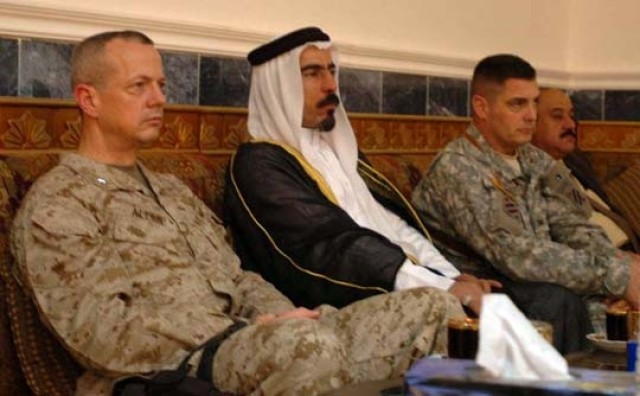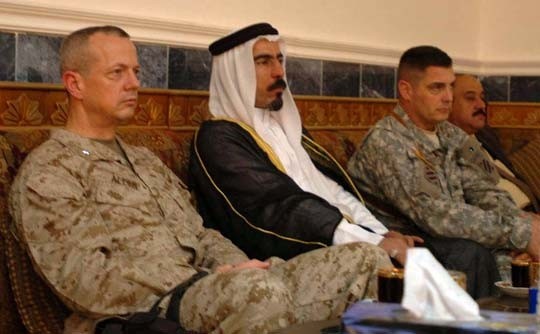
CAMP RAMADI, Iraq, March 9, 2007 - A cooperation, a presence and a movement by the people - these are the things that have improved conditions in the Anbar providence so Ramadi could begin rebuilding, said U.S. Marine Brig. Gen. John Allen, deputy commander Multi-National Forces - West following a reconstruction and economic growth conference March 7 in Ramadi.
The conference brought together coalition commanders and prominent city officials to highlight some of the upcoming reconstruction projects for the Ta'meem district in Ramadi.
"I really believe you have to look long and hard to find a closer relationship between the Iraqi forces and coalition forces," Allen said.
"First, the coalition forces have been fighting shoulder-to-shoulder with the Iraqi army and Iraqi police against the terrorists. And all of those parties, whether they are the coalition forces or the Iraqi police or army have paid a great price to fight the terrorists in this area."
During the conference, soldiers and Iraqis spoke about their goals and expectations for the reconstruction effort in the Ta'meem district.
"Ta'meem was one of the first areas the Iraqi Security Forces took back from the insurgents operating in Ramadi," said Ramadi Mayor Latif Iyada. "Ta'meem has needed a lot of work for quite some time, which makes them the first one on our list for reconstruction."
Col. John Charlton, 1st Brigade Combat Team, 3rd Infantry Division commander, said that the reconstruction will not only make Ramadi a better place to live it will also help increase employment across the region.
"All of these plans you see here today were developed by local government groups," he said "We have two functioning district councils who have been working with the civil affairs groups we have here to develop these plans. All plans are approved by district councils, which serve as the voice of the people of Ramadi."
Sheik Abdul Sattar, who helped spark the Anbar awakening movement, said that the biggest challenge for the people working for reconstruction in Ramadi is still Al Qaeda and the terrorists in the province.
"We have done a great deal against them here by uniting with the coalition forces to stop them," he said. "Hopefully one day we'll get rid of them all so that we'll have permanent security in the region."
Sattar said for security to become a permanent fixture in the region, a few things would need to be met first.
"We need to continue to work with the coalition forces here," he said. "Increase our cooperation, help out the victims of the violence, get the news more proactive in Anbar providence and begin the rebuilding of our schools, universities and hospitals.
"The time for dictatorship is gone, and we are welcoming the new dawn of democracy and freedom here," he added. "I expect the future to be much better for the next generation for they will live in a better world than we do today."

Social Sharing